2022年外研版中考英语二轮复习话题二 学校生活、情感与情绪、人际交往课件(共81张PPT)
文档属性
| 名称 | 2022年外研版中考英语二轮复习话题二 学校生活、情感与情绪、人际交往课件(共81张PPT) |  | |
| 格式 | pptx | ||
| 文件大小 | 368.0KB | ||
| 资源类型 | 教案 | ||
| 版本资源 | 外研版 | ||
| 科目 | 英语 | ||
| 更新时间 | 2022-05-25 15:46:45 | ||
图片预览

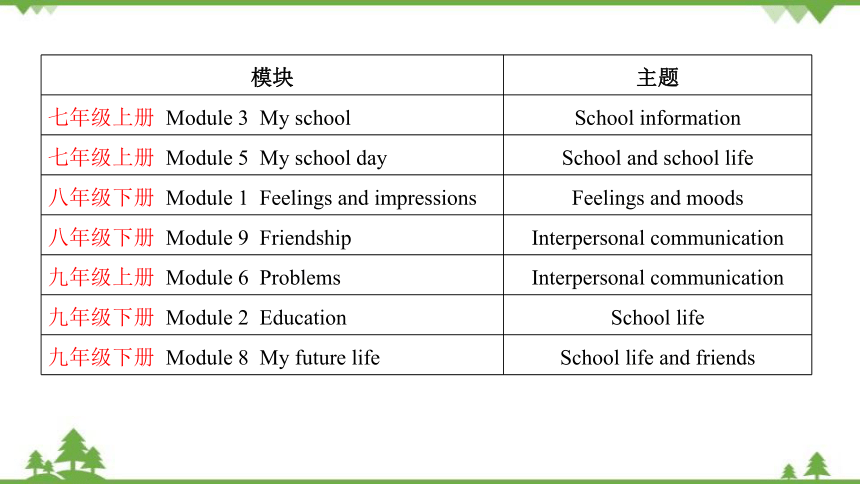
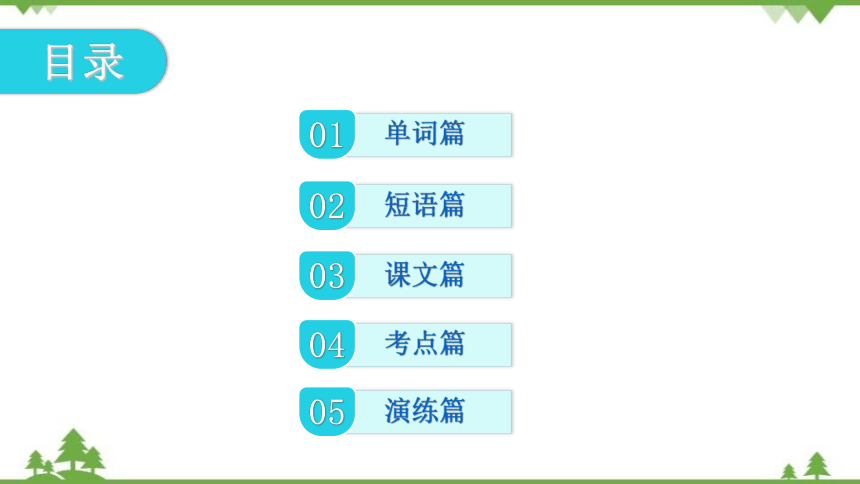
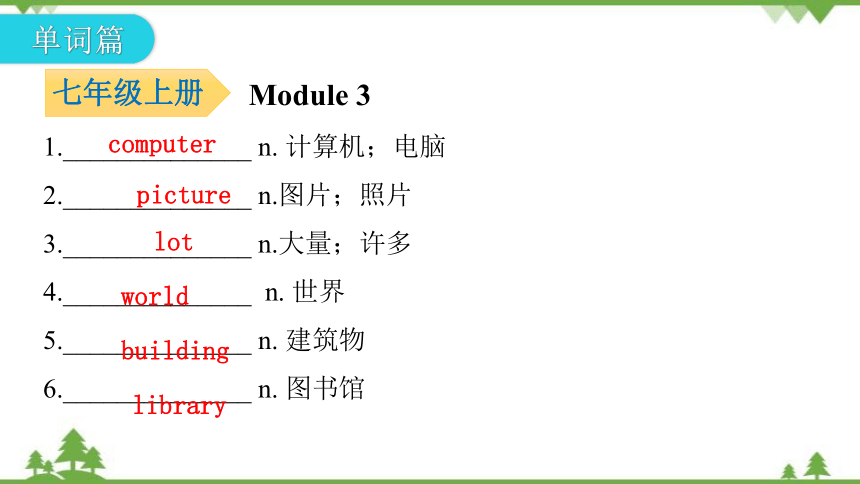
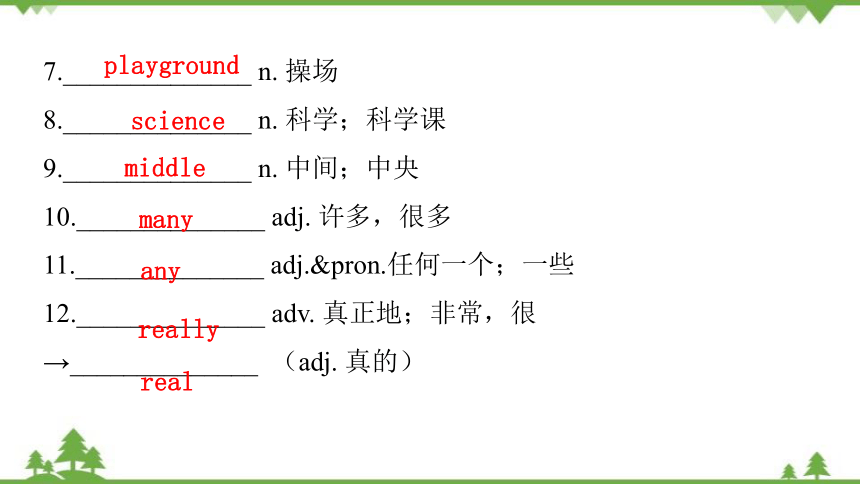
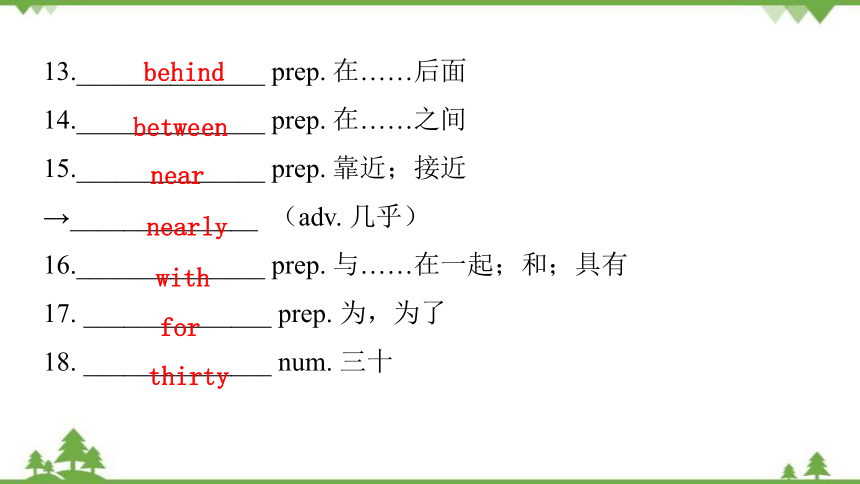


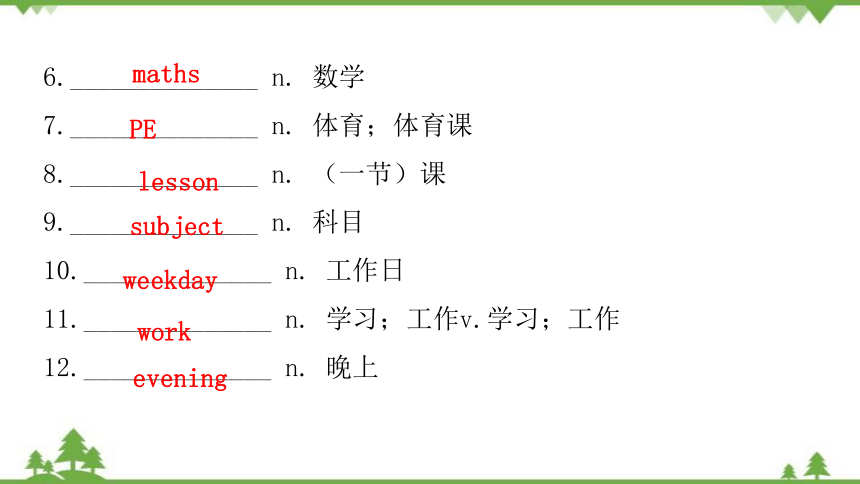
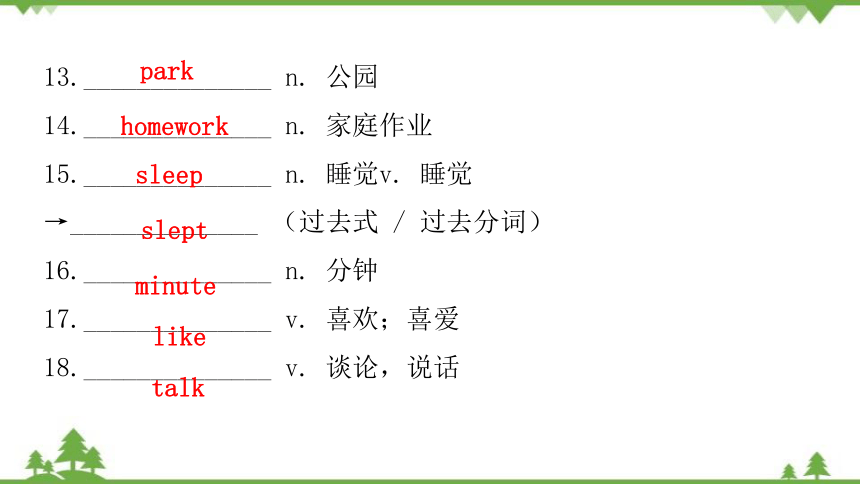
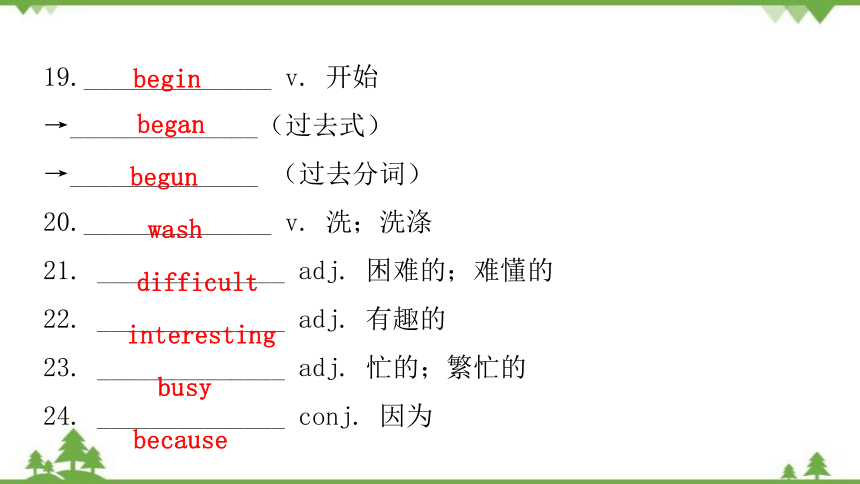
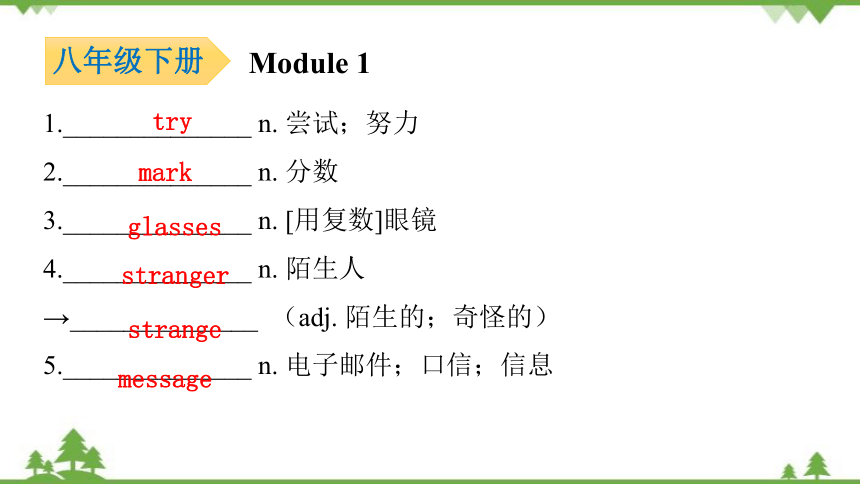
文档简介
(共81张PPT)
教材梳理(WY)
话题二 学校生活、情感与情绪、人际交往
模块 主题
七年级上册 Module 3 My school School information
七年级上册 Module 5 My school day School and school life
八年级下册 Module 1 Feelings and impressions Feelings and moods
八年级下册 Module 9 Friendship Interpersonal communication
九年级上册 Module 6 Problems Interpersonal communication
九年级下册 Module 2 Education School life
九年级下册 Module 8 My future life School life and friends
目录
01
单词篇
02
短语篇
03
课文篇
04
考点篇
05
演练篇
单词篇
七年级上册
Module 3
1.______________ n. 计算机;电脑
2.______________ n.图片;照片
3.______________ n.大量;许多
4.______________ n. 世界
5.______________ n. 建筑物
6.______________ n. 图书馆
computer
picture
lot
world
building
library
7.______________ n. 操场
8.______________ n. 科学;科学课
9.______________ n. 中间;中央
10.______________ adj. 许多,很多
11.______________ adj.&pron.任何一个;一些
12.______________ adv. 真正地;非常,很
→______________ (adj. 真的)
playground
science
middle
many
any
really
real
13.______________ prep. 在……后面
14.______________ prep. 在……之间
15.______________ prep. 靠近;接近
→______________ (adv. 几乎)
16.______________ prep. 与……在一起;和;具有
17. ______________ prep. 为,为了
18. ______________ num. 三十
behind
between
near
nearly
with
for
thirty
19. ______________ num. 四十
20.______________ num. 五十
21. ______________ num. 六十
22. ______________ num. 七十
23. ______________ num. 八十
24. ______________ num. 九十
forty
fifty
sixty
seventy
eighty
ninety
1.______________ n. 一半
2.______________ n.美术;艺术
→______________ (n. 艺术家)
3.______________ n.地理
4.______________ n. 历史
5.______________ n. (课间)休息
七年级上册
Module 5
half
art
artist
geography
history
break
6.______________ n. 数学
7.______________ n. 体育;体育课
8.______________ n. (一节)课
9.______________ n. 科目
10.______________ n. 工作日
11.______________ n. 学习;工作v.学习;工作
12.______________ n. 晚上
maths
PE
lesson
subject
weekday
work
evening
13.______________ n. 公园
14.______________ n. 家庭作业
15.______________ n. 睡觉v. 睡觉
→______________ (过去式 / 过去分词)
16.______________ n. 分钟
17.______________ v. 喜欢;喜爱
18.______________ v. 谈论,说话
park
homework
sleep
slept
minute
like
talk
19.______________ v. 开始
→______________(过去式)
→______________ (过去分词)
20.______________ v. 洗;洗涤
21. ______________ adj. 困难的;难懂的
22. ______________ adj. 有趣的
23. ______________ adj. 忙的;繁忙的
24. ______________ conj. 因为
begin
began
begun
wash
difficult
interesting
busy
because
1.______________ n. 尝试;努力
2.______________ n. 分数
3.______________ n. [用复数]眼镜
4.______________ n. 陌生人
→______________ (adj. 陌生的;奇怪的)
5.______________ n. 电子邮件;口信;信息
八年级下册
Module 1
try
mark
glasses
stranger
strange
message
6.______________ n. 业余爱好
→______________ (复数)
7.______________ n. 最喜欢的人或事
8.______________ v. 听起来;令人觉得
9.______________ adj. 软的;柔软的
10.______________ adj. 令人愉快的;可爱的
hobby
hobbies
favourite
sound
soft
lovely
11.______________ adj. 做完的
12.______________ adj. 情绪不安的;紧张的
13.______________ adj. 感到自豪的;感到骄傲的
14. ______________ adj. 秀丽的;标致的
done
nervous
proud
pretty
1.______________ n. 寂静;无声
→______________ (adj. 寂静的)
2.______________ n. 提议;建议
→______________(v. 建议)
3.______________ v. 使分开;分隔adj. 分开的
4.______________ v. 解释;说明
八年级下册
Module 9
silence
silent
suggestion
suggest
separate
explain
5.______________ v. 拒绝
6.______________ v. 懊悔;遗憾
7.______________ v. 介绍;引见
→______________ (n. 介绍)
8. ______________ v. 信任;信赖n.信任;信赖
9.______________ v. 包括;把……列为一部分
→______________ (prep. 包括)
refuse
regret
introduce
introduction
trust
include
including
10. ______________ v.对待;看待
11.______________ adj. 孤独的;寂寞的
12.______________ adj. 有耐心的;能忍耐的
→______________ (n. 耐心)
13.______________ adj. 欢快的;明亮的
14.______________ pron. 她自己
15.______________ conj. 是否
treat
lonely
patient
patience
bright
herself
whether
1.______________ n. 知识;学识
2.______________ n. 考试
3.______________ n. 吉他
4.______________ n. 习惯
5.______________ n. 志愿者
6.______________ n. (试图表达的)观点,看法
九年级上册
Module 6
knowledge
exam
guitar
habit
volunteer
point
7.______________ n. 原因;理由
8.______________ n. 事实;真相
→______________ (adj. 真的)
9.______________ v. 未能及格;未能达到
10.______________ v. 考虑;斟酌
11.______________ v. 认错;道歉
→______________ (n. 道歉)
reason
truth
true
fail
consider
apologise
apology
12.______________ adj. 音乐的
13.______________ adj. 必要的;必需的
14.______________ adj. 诚实的;老实的
→______________ (adj. 不诚实的)
→______________ (n.诚实)
15. ______________ adv. 代替;而不是
16. ______________ pron. 最少;最小
musical
necessary
honest
dishonest
honesty
instead
least
1.______________ n. 领带
2.______________ n.一排;一行;一列
3.______________ n.水池;游泳池
4.______________ v. 及格;通过(考试或检查)
5.______________ adj. 缺席的;不在的
6.______________ pron. 我们的
九年级下册
Module 2
tie
row
pool
pass
absent
ours
1.______________ n. 善举;好意
→______________ (adj. 友好的)
2.______________ n.短笺;便条
3.______________ v.计划;打算
4.______________ v. (去)取来;拿来
九年级下册
Module 8
kindness
kind
note
intend
fetch
5.______________ adj. 失望的;沮丧的
→______________ (n. 失望)
6.______________ pron. ……的人,那个人
disappointed
disappointment
whom
短语篇
七年级上册
Module 3
1.大量;许多 __________________
2.饭厅,饭堂 __________________
3.在……的最前面 _________________
4.在……的中间 __________________
a lot of
dining hall
at the front of
in the middle of
七年级上册
Module 5
1.上学 ___________________
2.起床 ___________________
3.回家 ___________________
4.吃早餐 ___________________
5.吃午餐 ___________________
go to school
get up
go home
have breakfast
have lunch
6.上床睡觉 ___________________
7.吃饭;吃晚餐 ___________________
8.开始睡觉;入睡 ___________________
go to bed
have dinner
go to sleep
八年级下册
Module 1
1.尝一尝;试试看 __________________________
2.在学校;上学 __________________________
3.为……而感到骄傲 __________________________
4.迫不及待做某事 __________________________
5.对……感到兴奋 __________________________
6.害怕做某事 __________________________
have a try
at school
be proud of …
can’t wait to do sth.
be excited about
be afraid of doing sth.
八年级下册
Module 9
1.参加 __________________
2.安静地;沉默地 __________________________
3.没什么;没关系 __________________
4.一天天地;渐渐地 __________________
5.保持联系 __________________
join in
in silence
no problem
day by day
stay in touch
6.与……交朋友 _________________
7.向某人提到某事 __________________
8.对……有耐心 __________________
make friends with
mention sth. to sb.
be patient with
九年级上册
Module 6
1.养成……的习惯 _________________________
2.而不是 __________________
3.拜访(某人的家)__________________
4.试用;试 __________________
5.不再__________________
get into the habit of …
instead of
come round
try out
no longer
6.生某人的气 _____________________
7.至少;起码 __________________
8.零花钱__________________
be angry with sb.
at least
pocket money
九年级下册
Module 2
1.中学___________________
2.坐成排 ___________________
3.与某人一起玩耍 ___________________
4.每学期一次 ___________________
5.家长会 ___________________
secondary school
sit in rows
play with sb.
once a term
parents’ meeting
6.(课间)休息 ___________________
7.在上课期间 ______________________
8.课外活动 _______________________
have a break
during school hours
after-school activities
九年级下册
Module 8
1.嘲笑;对……一笑置之 ____________________
2.放弃(努力) ____________________
3.尽某人最大的努力 ____________________
4.发表演讲 ____________________
laugh at
give up
try one’s best
make a speech
七年级上册
Module 3
1.你们英格兰的教室是什么样子的?
________________________________________________
2.在学校中央是一个大操场。
________________________________________________
课文篇
What’s your classroom in England like
In the middle of the school is a big playground.
3.位于图书馆左后方的是办公楼。
________________________________________________
4.图书馆在操场左侧,靠近学校大门。
________________________________________________
5.这幢楼和餐厅之间是教学楼,里面有24间教室。
______________________ and the ___________________ is the classroom building __________ twenty-four classrooms.
Behind the library, on the left, are the school offices.
The library is on the left of the playground near the school gate.
Between this building
dinning hall
with
七年级上册
Module 5
1.我喜欢历史课,而且我历史学得好。
________________________________________________
2.我们12点半在饭堂里吃午饭。
________________________________________________
I love history and I’m good at it.
We have lunch in the dining hall at half past twelve.
3.我早晨7点半起床,然后吃早餐。
_____________________________________________________
_____________________________________________________
4.我们8点钟上语文课,差5分9点上科学课。
_____________________________________________________
I get up at half past seven in the morning, and then have breakfast.
We have Chinese at eight o’clock and science at five to nine.
八年级下册
Module 1
1.你的比萨饼看起来很好。
_____________________________________________________
2.收到你的来信真的太好了。
_____________________________________________________
Your pizza looks so nice.
It was great to hear from you.
3.我没法表达对去中国的兴奋之情!
_____________________________________________
4.在学校,我花很多时间和我的朋友们演奏古典音乐。
______________________________________ with my friends at school.
I can’t tell you how excited I am about going to China!
I spend a lot of time playing classical music
八年级下册
Module 9
1.我不知道她是谁。
________________________________________________
2.微笑面对世界,它会向你报以微笑。
________________________________________________
I did not know who she was.
Smile at the world and it will smile back.
3.我能问问你跟她说过这事吗
_____________________________________________________
4.尽量弄清楚没有你她是否会感到孤独。
_____________________________________________________
Could I ask if you’ve mentioned this to her
Try to find out whether she feels lonely without you.
九年级上册
Module 6
1.你犯了两个错误。
_____________________________________________
2.现在没有必要做这件事(作业)。
_____________________________________________
3.原因是他认为我要是在电脑上玩游戏的话,电脑就会出毛病。
______________ that he thinks something will ______________ if I play games on it.
You have made two mistakes.
It isn’t necessary to do it now.
The reason is
go wrong
4.如果你只顾做这些事情而不做你的作业,你就没时间学习了。
If you do all these other things ________________________, you won’t __________________.
5.我想让你养成一放学回家就做家庭作业的习惯。
I want you to __________________________ your homework as soon as you come home from school.
instead of your homework
have time to study
get into the habit of doing
九年级下册
Module 2
1.所幸我们不用每门课程都考试。
____________________________________________________
2.上课前,我们的老师检查学生的出勤情况。
____________________________________________________
____________________________________________________
It’s lucky we don’t have exams in every subject.
Before class, our teacher checks which pupils are present or absent.
3.大多数英国学校都有运动场地。那里的孩子真的很喜欢踢足球。
Most English schools have ______________. Kids there really enjoy ______________.
4.我们的学校也很好,而且我们这里有更多的学生。这意味着有更多人一起玩。
Our school is great too, and we have more students here. _______________________________________.
sports grounds
playing football
This means more people to play with
九年级下册
Module 8
1.为我们的友谊干杯!
_____________________________________________________
2.我很自豪你们选择了我来做今天的演讲。
_____________________________________________________
3.我不知道我们什么时候能再一起回到这个大厅。
_____________________________________________________
Here’s to our friendship!
I’m very proud that you have chosen me to speak to you today.
I don’t know when we’ll be back in this hall together again.
4.即使回到英国,我也会回来看望你们大家的。
_____________________________________________________
5.我将白玫瑰献给我的老师们,他们教我(明白了)不努力就不会成功(的道理)。
I give the white rose to my teachers, who have taught me that ______________________________________.
Even if I go back to the UK, I’ll come back and visit you all.
there is no success without effort
考点1
There be句型的用法【七年级上册 Module 3】
专练
Eric’s father is a farmer. Instead of cows, pigs and horses, there _1_ corn, beans, strawberries and tomatoes around his house.
Eric doesn’t mind that there _2_ no animals. In fact, he likes living on a fruit-and-vegetable farm much better. He feels it’s
考点篇
is
are
magical that his dad is able to create something in the place where there _3_ nothing.
( )1. A. is B. was C. are D. were
( )2. A. is B. was C. are D. were
( )3. A. will be B. must be C. used to be D. had
A
C
C
used to be
点拨 there be句型表示“某处有某物”,遵循“就近原则”,即be动词与其后出现的主语保持数的一致。可数名词单数或不可数名词与is连用,可数名词复数与are连用。
考点2
行为动词的一般现在时(1)【七年级上册 Module 5】
专练 根据要求完成句子,每空一词
1.I like that blue shirt.(改为否定句)
I ________________ ________________ that blue shirt.
2.I have a break in the coffee shop.(改为一般疑问句,并作肯定回答)
—________ you ________ a break in the coffee shop
—Yes, I ________.
don’t
like
Do
have
do
3.They have dinner at seven in the evening.(就画线部分提问)
________________ ________________ ________________ they ________________ dinner in the evening
点拨 行为动词一般现在时的句式构成如下:(1)肯定句:主语+行为动词+其他.(2)疑问句:Do / Does+主语+行为动词原形+其他 其肯定回答为:Yes, 主语+do / does. 否定回答为:No, 主语+don’t / doesn’t. (3)特殊疑问句:疑问词+do / does+主语+行为动词原形+其他
What
time
do
have
考点3
表示感觉和知觉的系动词【八年级下册 Module 1】
专练
( )1.Betty is learning to sing an English song and it ________ very beautiful.
A.feels B.tastes C.sounds D.looks
( )2.Look at the bed. It ________ soft and comfortable.
A.sounds B.tastes C.feels D.smells
C
C
( )3.Joe ________ happy, because he has lost his book.
A.looks B.not looks
C.looks not D.doesn’t look
点拨 感官动词后接形容词,常见的感官动词有:look(看起来),feel(感觉;摸起来),smell(闻起来),sound(听起来),taste(尝起来)。
D
考点4
whether / if及疑问词引导的宾语从句【八年级下册 Module 9】
专练 根据句意,在横线上填入适当的疑问词或连词
1.Always tell your parents _______________ you are going and _______________ you expect to be home.
2. Alan asked Judy _______________ he could borrow her new book or not, because he liked it.
3.Billy, someone is ringing the doorbell. Go and see ___________ it is, please.
where
when
whether
who
点拨 if / whether意为“是否”,在宾语从句中不能省略。如果从句后面还有or not,一般就要选择whether。如果遇到“什么时间、什么地点、什么方式、什么原因”之类的疑问时,要使用相应的疑问词来引导从句。
考点5
状语从句(5)【九年级上册 Module 6】
专练 用所给单词的适当形式填空
1.If Mr White _______________ (say) I am hard-working, my parents _______________ (feel) glad.
2.If there ________ (be) more trees, there ________ (be) less pollution.
3.I don’t know if my aunt _______________ (come). If she _______________(come) , I will be very happy.
says
will feel
are
will be
will come
comes
点拨 if意为 “如果”。由if引导的条件状语从句表示在某种条件下某事很可能发生,遵循“主将从现”的原则,即主句是一般将来时,从句用一般现在时。如果if引导的是宾语从句,则从句的时态根据句子的意思而定。
考点6
代词、介词与介词短语【九年级下册 Module 2】
专练
( )1.Kids, don’t lose ________ in playing computer games. It is bad for your eyes.
A.himself B.yourself C.themselves D.yourselves
( )2.Kate arrived ________ the village ________ a snowy night.
A.at; on B.at; in C.in; at D.in; on
D
A
( )3.—Why are you standing, Megan
—I can’t see the blackboard clearly. Three tall boys are sitting ________ me.
A.behind B.in front of C.between D.next to
点拨 详解见主书第一部分“第四节 介词和介词短语”“第五节 代词”。
B
考点7
宾语从句和定语从句【九年级下册 Module 8】
专练
A window is a common but powerful tool—a patch(小块) of the world, from _1_ our body is separated. The only thing _2_ we can do is to look. You can enjoy _3_ you see. But you have no influence on everything or everyone _4_ you will see. Your brain may make an assumption(假定) out of whatever happens to appear.
which
/
what
that
( )1. A. that B. which C. what D. when
( )2. A. / B. why C. what D. when
( )3. A. that B. who C. what D. when
( )4. A. that B. who C. what D. when
点拨 详解见主书第一部分“第十二节 宾语从句”“第十三节 定语从句”。
B
A
C
A
演练篇
一、完形填空
Students in different countries like keeping a good relationship with their classmates in different ways.Some will meet their friends at a coffee shop, some would like to go bike riding together, and some may go to a party or hang out with their friends.
Some students in Britain or America like to invite their _1_ to dinner at home after an exam.When your classmate invites you to an evening meal, the_2_ thing for you to do is to answer it.
friends
first
You have to tell him or her whether you are _3_ or not. Then you can ask your classmate what you should do for it and what time you should _4_. It is very important that you make sure you can be there on time.Don’t arrive early _5_ they may not prepare well for it. And one thing you should know is to dress _6_. In this way you show your respect to others and the host family. If you have a flu and you can’t _7_ it, you should tell your classmate one day before it.
available
arrive
because
well
take part in
Besides, other students may like to _8_ with their classmates in the shopping mall. They do some shopping, play games with each other. That will be great fun for them. Sometimes they play so _9_ that they forget the time and don’t go home _10_ very late. They may miss the last bus and have to catch a taxi home.
hang out
happily
until
( )1.A.teachers B.doctors C.friends D.pilots
( )2.A.first B.second C.third D.fourth
( )3.A.surprised B.sad C.available D.excited
( )4.A.want B.shop C.sleep D.arrive
( )5.A.because B.though C.but D.and
C
A
C
D
A
( )6.A.casually B.well C.easily D.differently
( )7.A.take part in B.get along with
C.give back to D.go to sleep
( )8.A.give out B.hang out C.take out D.come out
( )9.A.angrily B.carefully C.quickly D.happily
( )10.A.when B.since C.until D.if
B
A
B
D
C
二、阅读理解(B篇)
Learning to laugh at yourself is one of the biggest differences between happy people and depressed(沮丧的) people. If you can turn hard moments, mistakes, and shortcomings as chances for a good laugh at yourself, those things will affect(影响) you less and you will become a happy person.
Laughing at yourself helps to tell the differences between “who you are” and “what you do”. Everyone possibly makes a mistake sometimes, and it doesn’t have to define(界定) you as a person. Laughing at yourself can tell you and the people around you that making mistakes is okay.
Don’t worry about the sound of your laugh. Everyone’s laugh is different, if yours is polite and it comes from reasonable joy, you don’t need to worry about having an “ugly” laugh.
If you’re worried about laughing and often worried about what people will think of you, it’s hard to really have fun. If you’re with the kind of friends who make fun of someone for laughing, you should abandon these friends. Try to find some new friends.
Take your time. Even a busy person should learn to spare time for himself and spend time just staying alone. Doing these will help you relax and keep you calm and ready to laugh.
Make sure you do something you enjoy each day. Relax by playing a record and smiling at yourself, having your favourite drink.
Try to add 15 minutes to your day to do something like watching a comedy or looking at humorous photos online. Try to put this in your timetable right after the most stressful part of your day if you can. Finally, you will be a person whose life is full of laugh.
( )11. Laughing at yourself can ________.
A. make you depressed B. make a few mistakes
C. make you different from others D. make you happy
( )12. People can know making mistakes is okay by ________.
A. laughing at themselves
B. worrying about the sound of their laughs
C. having reasonable joy
D. having an ugly laugh
D
A
( )13. The word “abandon” in Paragraph 4 means ______.
A. choose B. improve C. respect D. leave
( )14. According to the passage, which of the following is TRUE
A. Everyone should have an ugly laugh.
B. People’s laughs can’t be different from each other’s.
C. Smiling at themselves can make people enjoy each day.
D. People can do everything they like to be happy.
D
C
( )15. The best title of the passage is ________.
A. Laugh at yourself
B. Laugh at your friends
C. The sound of your laugh
D. Laugh 15 minutes a day
A
三、回答问题
请阅读下面这篇文章,根据所提供的信息,回答5个问题。要求所写答案语法正确、语义完整,并把答案写在横线上。
Dear Alice,
I am very happy that you like your new school in London.Now let me tell you something about my school.
I go to school five days a week.We have four lessons in the morning and two lessons in the afternoon.We have many
续表
interesting things to do after class.On Monday and Wednesday, we play sports on the playground.On Tuesday afternoon,some of us have an art class.On Thursday afternoon,some have a singing class in the music room.We can enjoy beautiful music.On Friday afternoon,we have an English-speaking class.Our English teacher is Miss Wang.She is about 30 years old.I like her because her classes are full of fun.She tells us that English is a useful subject.She hopes we can learn it well.
续表
On Saturday and Sunday,I don’t go to school.We are free to do what we like.Very often I go to the park and have a good time with my family there.That’s very cool.
I like my school life.How about you What’s your favourite subject
Write to me soon.
Yours,
Helen
16.Where is Alice now
_____________________________________________________
17.How many lessons does Helen have a day at school
_____________________________________________________
18.When can Helen play sports
_____________________________________________________
_____________________________________________________
Alice / She is in London now./ In London.
Helen / She has six / 6 lessons a day at school. / Six / 6.
Helen / She can play sports on Monday and Wednesday. / On Monday and Wednesday.
19.Why does Helen like Miss Wang
_____________________________________________________
20.What does Helen usually do at the weekend
_____________________________________________________
_____________________________________________________
Because Miss Wang’s / her classes are full of fun.
Helen / She usually goes to the park and has a good time with her family at the weekend.
谢 谢!
教材梳理(WY)
话题二 学校生活、情感与情绪、人际交往
模块 主题
七年级上册 Module 3 My school School information
七年级上册 Module 5 My school day School and school life
八年级下册 Module 1 Feelings and impressions Feelings and moods
八年级下册 Module 9 Friendship Interpersonal communication
九年级上册 Module 6 Problems Interpersonal communication
九年级下册 Module 2 Education School life
九年级下册 Module 8 My future life School life and friends
目录
01
单词篇
02
短语篇
03
课文篇
04
考点篇
05
演练篇
单词篇
七年级上册
Module 3
1.______________ n. 计算机;电脑
2.______________ n.图片;照片
3.______________ n.大量;许多
4.______________ n. 世界
5.______________ n. 建筑物
6.______________ n. 图书馆
computer
picture
lot
world
building
library
7.______________ n. 操场
8.______________ n. 科学;科学课
9.______________ n. 中间;中央
10.______________ adj. 许多,很多
11.______________ adj.&pron.任何一个;一些
12.______________ adv. 真正地;非常,很
→______________ (adj. 真的)
playground
science
middle
many
any
really
real
13.______________ prep. 在……后面
14.______________ prep. 在……之间
15.______________ prep. 靠近;接近
→______________ (adv. 几乎)
16.______________ prep. 与……在一起;和;具有
17. ______________ prep. 为,为了
18. ______________ num. 三十
behind
between
near
nearly
with
for
thirty
19. ______________ num. 四十
20.______________ num. 五十
21. ______________ num. 六十
22. ______________ num. 七十
23. ______________ num. 八十
24. ______________ num. 九十
forty
fifty
sixty
seventy
eighty
ninety
1.______________ n. 一半
2.______________ n.美术;艺术
→______________ (n. 艺术家)
3.______________ n.地理
4.______________ n. 历史
5.______________ n. (课间)休息
七年级上册
Module 5
half
art
artist
geography
history
break
6.______________ n. 数学
7.______________ n. 体育;体育课
8.______________ n. (一节)课
9.______________ n. 科目
10.______________ n. 工作日
11.______________ n. 学习;工作v.学习;工作
12.______________ n. 晚上
maths
PE
lesson
subject
weekday
work
evening
13.______________ n. 公园
14.______________ n. 家庭作业
15.______________ n. 睡觉v. 睡觉
→______________ (过去式 / 过去分词)
16.______________ n. 分钟
17.______________ v. 喜欢;喜爱
18.______________ v. 谈论,说话
park
homework
sleep
slept
minute
like
talk
19.______________ v. 开始
→______________(过去式)
→______________ (过去分词)
20.______________ v. 洗;洗涤
21. ______________ adj. 困难的;难懂的
22. ______________ adj. 有趣的
23. ______________ adj. 忙的;繁忙的
24. ______________ conj. 因为
begin
began
begun
wash
difficult
interesting
busy
because
1.______________ n. 尝试;努力
2.______________ n. 分数
3.______________ n. [用复数]眼镜
4.______________ n. 陌生人
→______________ (adj. 陌生的;奇怪的)
5.______________ n. 电子邮件;口信;信息
八年级下册
Module 1
try
mark
glasses
stranger
strange
message
6.______________ n. 业余爱好
→______________ (复数)
7.______________ n. 最喜欢的人或事
8.______________ v. 听起来;令人觉得
9.______________ adj. 软的;柔软的
10.______________ adj. 令人愉快的;可爱的
hobby
hobbies
favourite
sound
soft
lovely
11.______________ adj. 做完的
12.______________ adj. 情绪不安的;紧张的
13.______________ adj. 感到自豪的;感到骄傲的
14. ______________ adj. 秀丽的;标致的
done
nervous
proud
pretty
1.______________ n. 寂静;无声
→______________ (adj. 寂静的)
2.______________ n. 提议;建议
→______________(v. 建议)
3.______________ v. 使分开;分隔adj. 分开的
4.______________ v. 解释;说明
八年级下册
Module 9
silence
silent
suggestion
suggest
separate
explain
5.______________ v. 拒绝
6.______________ v. 懊悔;遗憾
7.______________ v. 介绍;引见
→______________ (n. 介绍)
8. ______________ v. 信任;信赖n.信任;信赖
9.______________ v. 包括;把……列为一部分
→______________ (prep. 包括)
refuse
regret
introduce
introduction
trust
include
including
10. ______________ v.对待;看待
11.______________ adj. 孤独的;寂寞的
12.______________ adj. 有耐心的;能忍耐的
→______________ (n. 耐心)
13.______________ adj. 欢快的;明亮的
14.______________ pron. 她自己
15.______________ conj. 是否
treat
lonely
patient
patience
bright
herself
whether
1.______________ n. 知识;学识
2.______________ n. 考试
3.______________ n. 吉他
4.______________ n. 习惯
5.______________ n. 志愿者
6.______________ n. (试图表达的)观点,看法
九年级上册
Module 6
knowledge
exam
guitar
habit
volunteer
point
7.______________ n. 原因;理由
8.______________ n. 事实;真相
→______________ (adj. 真的)
9.______________ v. 未能及格;未能达到
10.______________ v. 考虑;斟酌
11.______________ v. 认错;道歉
→______________ (n. 道歉)
reason
truth
true
fail
consider
apologise
apology
12.______________ adj. 音乐的
13.______________ adj. 必要的;必需的
14.______________ adj. 诚实的;老实的
→______________ (adj. 不诚实的)
→______________ (n.诚实)
15. ______________ adv. 代替;而不是
16. ______________ pron. 最少;最小
musical
necessary
honest
dishonest
honesty
instead
least
1.______________ n. 领带
2.______________ n.一排;一行;一列
3.______________ n.水池;游泳池
4.______________ v. 及格;通过(考试或检查)
5.______________ adj. 缺席的;不在的
6.______________ pron. 我们的
九年级下册
Module 2
tie
row
pool
pass
absent
ours
1.______________ n. 善举;好意
→______________ (adj. 友好的)
2.______________ n.短笺;便条
3.______________ v.计划;打算
4.______________ v. (去)取来;拿来
九年级下册
Module 8
kindness
kind
note
intend
fetch
5.______________ adj. 失望的;沮丧的
→______________ (n. 失望)
6.______________ pron. ……的人,那个人
disappointed
disappointment
whom
短语篇
七年级上册
Module 3
1.大量;许多 __________________
2.饭厅,饭堂 __________________
3.在……的最前面 _________________
4.在……的中间 __________________
a lot of
dining hall
at the front of
in the middle of
七年级上册
Module 5
1.上学 ___________________
2.起床 ___________________
3.回家 ___________________
4.吃早餐 ___________________
5.吃午餐 ___________________
go to school
get up
go home
have breakfast
have lunch
6.上床睡觉 ___________________
7.吃饭;吃晚餐 ___________________
8.开始睡觉;入睡 ___________________
go to bed
have dinner
go to sleep
八年级下册
Module 1
1.尝一尝;试试看 __________________________
2.在学校;上学 __________________________
3.为……而感到骄傲 __________________________
4.迫不及待做某事 __________________________
5.对……感到兴奋 __________________________
6.害怕做某事 __________________________
have a try
at school
be proud of …
can’t wait to do sth.
be excited about
be afraid of doing sth.
八年级下册
Module 9
1.参加 __________________
2.安静地;沉默地 __________________________
3.没什么;没关系 __________________
4.一天天地;渐渐地 __________________
5.保持联系 __________________
join in
in silence
no problem
day by day
stay in touch
6.与……交朋友 _________________
7.向某人提到某事 __________________
8.对……有耐心 __________________
make friends with
mention sth. to sb.
be patient with
九年级上册
Module 6
1.养成……的习惯 _________________________
2.而不是 __________________
3.拜访(某人的家)__________________
4.试用;试 __________________
5.不再__________________
get into the habit of …
instead of
come round
try out
no longer
6.生某人的气 _____________________
7.至少;起码 __________________
8.零花钱__________________
be angry with sb.
at least
pocket money
九年级下册
Module 2
1.中学___________________
2.坐成排 ___________________
3.与某人一起玩耍 ___________________
4.每学期一次 ___________________
5.家长会 ___________________
secondary school
sit in rows
play with sb.
once a term
parents’ meeting
6.(课间)休息 ___________________
7.在上课期间 ______________________
8.课外活动 _______________________
have a break
during school hours
after-school activities
九年级下册
Module 8
1.嘲笑;对……一笑置之 ____________________
2.放弃(努力) ____________________
3.尽某人最大的努力 ____________________
4.发表演讲 ____________________
laugh at
give up
try one’s best
make a speech
七年级上册
Module 3
1.你们英格兰的教室是什么样子的?
________________________________________________
2.在学校中央是一个大操场。
________________________________________________
课文篇
What’s your classroom in England like
In the middle of the school is a big playground.
3.位于图书馆左后方的是办公楼。
________________________________________________
4.图书馆在操场左侧,靠近学校大门。
________________________________________________
5.这幢楼和餐厅之间是教学楼,里面有24间教室。
______________________ and the ___________________ is the classroom building __________ twenty-four classrooms.
Behind the library, on the left, are the school offices.
The library is on the left of the playground near the school gate.
Between this building
dinning hall
with
七年级上册
Module 5
1.我喜欢历史课,而且我历史学得好。
________________________________________________
2.我们12点半在饭堂里吃午饭。
________________________________________________
I love history and I’m good at it.
We have lunch in the dining hall at half past twelve.
3.我早晨7点半起床,然后吃早餐。
_____________________________________________________
_____________________________________________________
4.我们8点钟上语文课,差5分9点上科学课。
_____________________________________________________
I get up at half past seven in the morning, and then have breakfast.
We have Chinese at eight o’clock and science at five to nine.
八年级下册
Module 1
1.你的比萨饼看起来很好。
_____________________________________________________
2.收到你的来信真的太好了。
_____________________________________________________
Your pizza looks so nice.
It was great to hear from you.
3.我没法表达对去中国的兴奋之情!
_____________________________________________
4.在学校,我花很多时间和我的朋友们演奏古典音乐。
______________________________________ with my friends at school.
I can’t tell you how excited I am about going to China!
I spend a lot of time playing classical music
八年级下册
Module 9
1.我不知道她是谁。
________________________________________________
2.微笑面对世界,它会向你报以微笑。
________________________________________________
I did not know who she was.
Smile at the world and it will smile back.
3.我能问问你跟她说过这事吗
_____________________________________________________
4.尽量弄清楚没有你她是否会感到孤独。
_____________________________________________________
Could I ask if you’ve mentioned this to her
Try to find out whether she feels lonely without you.
九年级上册
Module 6
1.你犯了两个错误。
_____________________________________________
2.现在没有必要做这件事(作业)。
_____________________________________________
3.原因是他认为我要是在电脑上玩游戏的话,电脑就会出毛病。
______________ that he thinks something will ______________ if I play games on it.
You have made two mistakes.
It isn’t necessary to do it now.
The reason is
go wrong
4.如果你只顾做这些事情而不做你的作业,你就没时间学习了。
If you do all these other things ________________________, you won’t __________________.
5.我想让你养成一放学回家就做家庭作业的习惯。
I want you to __________________________ your homework as soon as you come home from school.
instead of your homework
have time to study
get into the habit of doing
九年级下册
Module 2
1.所幸我们不用每门课程都考试。
____________________________________________________
2.上课前,我们的老师检查学生的出勤情况。
____________________________________________________
____________________________________________________
It’s lucky we don’t have exams in every subject.
Before class, our teacher checks which pupils are present or absent.
3.大多数英国学校都有运动场地。那里的孩子真的很喜欢踢足球。
Most English schools have ______________. Kids there really enjoy ______________.
4.我们的学校也很好,而且我们这里有更多的学生。这意味着有更多人一起玩。
Our school is great too, and we have more students here. _______________________________________.
sports grounds
playing football
This means more people to play with
九年级下册
Module 8
1.为我们的友谊干杯!
_____________________________________________________
2.我很自豪你们选择了我来做今天的演讲。
_____________________________________________________
3.我不知道我们什么时候能再一起回到这个大厅。
_____________________________________________________
Here’s to our friendship!
I’m very proud that you have chosen me to speak to you today.
I don’t know when we’ll be back in this hall together again.
4.即使回到英国,我也会回来看望你们大家的。
_____________________________________________________
5.我将白玫瑰献给我的老师们,他们教我(明白了)不努力就不会成功(的道理)。
I give the white rose to my teachers, who have taught me that ______________________________________.
Even if I go back to the UK, I’ll come back and visit you all.
there is no success without effort
考点1
There be句型的用法【七年级上册 Module 3】
专练
Eric’s father is a farmer. Instead of cows, pigs and horses, there _1_ corn, beans, strawberries and tomatoes around his house.
Eric doesn’t mind that there _2_ no animals. In fact, he likes living on a fruit-and-vegetable farm much better. He feels it’s
考点篇
is
are
magical that his dad is able to create something in the place where there _3_ nothing.
( )1. A. is B. was C. are D. were
( )2. A. is B. was C. are D. were
( )3. A. will be B. must be C. used to be D. had
A
C
C
used to be
点拨 there be句型表示“某处有某物”,遵循“就近原则”,即be动词与其后出现的主语保持数的一致。可数名词单数或不可数名词与is连用,可数名词复数与are连用。
考点2
行为动词的一般现在时(1)【七年级上册 Module 5】
专练 根据要求完成句子,每空一词
1.I like that blue shirt.(改为否定句)
I ________________ ________________ that blue shirt.
2.I have a break in the coffee shop.(改为一般疑问句,并作肯定回答)
—________ you ________ a break in the coffee shop
—Yes, I ________.
don’t
like
Do
have
do
3.They have dinner at seven in the evening.(就画线部分提问)
________________ ________________ ________________ they ________________ dinner in the evening
点拨 行为动词一般现在时的句式构成如下:(1)肯定句:主语+行为动词+其他.(2)疑问句:Do / Does+主语+行为动词原形+其他 其肯定回答为:Yes, 主语+do / does. 否定回答为:No, 主语+don’t / doesn’t. (3)特殊疑问句:疑问词+do / does+主语+行为动词原形+其他
What
time
do
have
考点3
表示感觉和知觉的系动词【八年级下册 Module 1】
专练
( )1.Betty is learning to sing an English song and it ________ very beautiful.
A.feels B.tastes C.sounds D.looks
( )2.Look at the bed. It ________ soft and comfortable.
A.sounds B.tastes C.feels D.smells
C
C
( )3.Joe ________ happy, because he has lost his book.
A.looks B.not looks
C.looks not D.doesn’t look
点拨 感官动词后接形容词,常见的感官动词有:look(看起来),feel(感觉;摸起来),smell(闻起来),sound(听起来),taste(尝起来)。
D
考点4
whether / if及疑问词引导的宾语从句【八年级下册 Module 9】
专练 根据句意,在横线上填入适当的疑问词或连词
1.Always tell your parents _______________ you are going and _______________ you expect to be home.
2. Alan asked Judy _______________ he could borrow her new book or not, because he liked it.
3.Billy, someone is ringing the doorbell. Go and see ___________ it is, please.
where
when
whether
who
点拨 if / whether意为“是否”,在宾语从句中不能省略。如果从句后面还有or not,一般就要选择whether。如果遇到“什么时间、什么地点、什么方式、什么原因”之类的疑问时,要使用相应的疑问词来引导从句。
考点5
状语从句(5)【九年级上册 Module 6】
专练 用所给单词的适当形式填空
1.If Mr White _______________ (say) I am hard-working, my parents _______________ (feel) glad.
2.If there ________ (be) more trees, there ________ (be) less pollution.
3.I don’t know if my aunt _______________ (come). If she _______________(come) , I will be very happy.
says
will feel
are
will be
will come
comes
点拨 if意为 “如果”。由if引导的条件状语从句表示在某种条件下某事很可能发生,遵循“主将从现”的原则,即主句是一般将来时,从句用一般现在时。如果if引导的是宾语从句,则从句的时态根据句子的意思而定。
考点6
代词、介词与介词短语【九年级下册 Module 2】
专练
( )1.Kids, don’t lose ________ in playing computer games. It is bad for your eyes.
A.himself B.yourself C.themselves D.yourselves
( )2.Kate arrived ________ the village ________ a snowy night.
A.at; on B.at; in C.in; at D.in; on
D
A
( )3.—Why are you standing, Megan
—I can’t see the blackboard clearly. Three tall boys are sitting ________ me.
A.behind B.in front of C.between D.next to
点拨 详解见主书第一部分“第四节 介词和介词短语”“第五节 代词”。
B
考点7
宾语从句和定语从句【九年级下册 Module 8】
专练
A window is a common but powerful tool—a patch(小块) of the world, from _1_ our body is separated. The only thing _2_ we can do is to look. You can enjoy _3_ you see. But you have no influence on everything or everyone _4_ you will see. Your brain may make an assumption(假定) out of whatever happens to appear.
which
/
what
that
( )1. A. that B. which C. what D. when
( )2. A. / B. why C. what D. when
( )3. A. that B. who C. what D. when
( )4. A. that B. who C. what D. when
点拨 详解见主书第一部分“第十二节 宾语从句”“第十三节 定语从句”。
B
A
C
A
演练篇
一、完形填空
Students in different countries like keeping a good relationship with their classmates in different ways.Some will meet their friends at a coffee shop, some would like to go bike riding together, and some may go to a party or hang out with their friends.
Some students in Britain or America like to invite their _1_ to dinner at home after an exam.When your classmate invites you to an evening meal, the_2_ thing for you to do is to answer it.
friends
first
You have to tell him or her whether you are _3_ or not. Then you can ask your classmate what you should do for it and what time you should _4_. It is very important that you make sure you can be there on time.Don’t arrive early _5_ they may not prepare well for it. And one thing you should know is to dress _6_. In this way you show your respect to others and the host family. If you have a flu and you can’t _7_ it, you should tell your classmate one day before it.
available
arrive
because
well
take part in
Besides, other students may like to _8_ with their classmates in the shopping mall. They do some shopping, play games with each other. That will be great fun for them. Sometimes they play so _9_ that they forget the time and don’t go home _10_ very late. They may miss the last bus and have to catch a taxi home.
hang out
happily
until
( )1.A.teachers B.doctors C.friends D.pilots
( )2.A.first B.second C.third D.fourth
( )3.A.surprised B.sad C.available D.excited
( )4.A.want B.shop C.sleep D.arrive
( )5.A.because B.though C.but D.and
C
A
C
D
A
( )6.A.casually B.well C.easily D.differently
( )7.A.take part in B.get along with
C.give back to D.go to sleep
( )8.A.give out B.hang out C.take out D.come out
( )9.A.angrily B.carefully C.quickly D.happily
( )10.A.when B.since C.until D.if
B
A
B
D
C
二、阅读理解(B篇)
Learning to laugh at yourself is one of the biggest differences between happy people and depressed(沮丧的) people. If you can turn hard moments, mistakes, and shortcomings as chances for a good laugh at yourself, those things will affect(影响) you less and you will become a happy person.
Laughing at yourself helps to tell the differences between “who you are” and “what you do”. Everyone possibly makes a mistake sometimes, and it doesn’t have to define(界定) you as a person. Laughing at yourself can tell you and the people around you that making mistakes is okay.
Don’t worry about the sound of your laugh. Everyone’s laugh is different, if yours is polite and it comes from reasonable joy, you don’t need to worry about having an “ugly” laugh.
If you’re worried about laughing and often worried about what people will think of you, it’s hard to really have fun. If you’re with the kind of friends who make fun of someone for laughing, you should abandon these friends. Try to find some new friends.
Take your time. Even a busy person should learn to spare time for himself and spend time just staying alone. Doing these will help you relax and keep you calm and ready to laugh.
Make sure you do something you enjoy each day. Relax by playing a record and smiling at yourself, having your favourite drink.
Try to add 15 minutes to your day to do something like watching a comedy or looking at humorous photos online. Try to put this in your timetable right after the most stressful part of your day if you can. Finally, you will be a person whose life is full of laugh.
( )11. Laughing at yourself can ________.
A. make you depressed B. make a few mistakes
C. make you different from others D. make you happy
( )12. People can know making mistakes is okay by ________.
A. laughing at themselves
B. worrying about the sound of their laughs
C. having reasonable joy
D. having an ugly laugh
D
A
( )13. The word “abandon” in Paragraph 4 means ______.
A. choose B. improve C. respect D. leave
( )14. According to the passage, which of the following is TRUE
A. Everyone should have an ugly laugh.
B. People’s laughs can’t be different from each other’s.
C. Smiling at themselves can make people enjoy each day.
D. People can do everything they like to be happy.
D
C
( )15. The best title of the passage is ________.
A. Laugh at yourself
B. Laugh at your friends
C. The sound of your laugh
D. Laugh 15 minutes a day
A
三、回答问题
请阅读下面这篇文章,根据所提供的信息,回答5个问题。要求所写答案语法正确、语义完整,并把答案写在横线上。
Dear Alice,
I am very happy that you like your new school in London.Now let me tell you something about my school.
I go to school five days a week.We have four lessons in the morning and two lessons in the afternoon.We have many
续表
interesting things to do after class.On Monday and Wednesday, we play sports on the playground.On Tuesday afternoon,some of us have an art class.On Thursday afternoon,some have a singing class in the music room.We can enjoy beautiful music.On Friday afternoon,we have an English-speaking class.Our English teacher is Miss Wang.She is about 30 years old.I like her because her classes are full of fun.She tells us that English is a useful subject.She hopes we can learn it well.
续表
On Saturday and Sunday,I don’t go to school.We are free to do what we like.Very often I go to the park and have a good time with my family there.That’s very cool.
I like my school life.How about you What’s your favourite subject
Write to me soon.
Yours,
Helen
16.Where is Alice now
_____________________________________________________
17.How many lessons does Helen have a day at school
_____________________________________________________
18.When can Helen play sports
_____________________________________________________
_____________________________________________________
Alice / She is in London now./ In London.
Helen / She has six / 6 lessons a day at school. / Six / 6.
Helen / She can play sports on Monday and Wednesday. / On Monday and Wednesday.
19.Why does Helen like Miss Wang
_____________________________________________________
20.What does Helen usually do at the weekend
_____________________________________________________
_____________________________________________________
Because Miss Wang’s / her classes are full of fun.
Helen / She usually goes to the park and has a good time with her family at the weekend.
谢 谢!
同课章节目录
- 词法
- 名词
- 动词和动词短语
- 动词语态
- 动词时态
- 助动词和情态动词
- 非谓语动词
- 冠词
- 代词
- 数词和量词
- 形容词副词及其比较等级
- 介词和介词短语
- 连词和感叹词
- 构词法
- 相似、相近词比较
- 句法
- 陈述句
- 一般疑问句和否定疑问句
- 特殊疑问句及选择疑问句
- 反意疑问句
- 存在句(There be句型)
- 宾语从句
- 定语从句
- 状语从句
- 主谓一致问题
- 简单句
- 并列句
- 复合句
- 主谓一致
- 主、表语从句
- 名词性从句
- 直接引语和间接引语
- 虚拟语气
- 感叹句
- 强调句
- 倒装句
- 祈使句
- 句子的成分
- 句子的分类
- 题型专区
- 单项选择部分
- 易错题
- 完形填空
- 阅读理解
- 词汇练习
- 听说训练
- 句型转换
- 补全对话
- 短文改错
- 翻译
- 书面表达
- 任务型阅读
- 语法填空
- 其他资料
